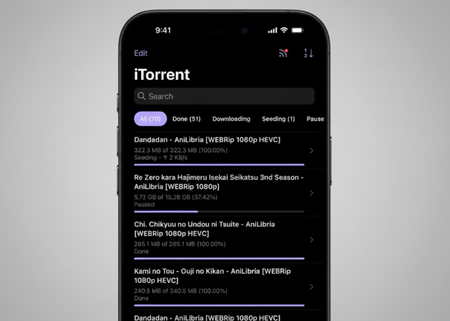IPhone and iPad users in the European Union can do something unpublished in the rest of the world: install alternative application stores and download apps directly from the developer’s website. This opening was not born from a change of philosophy in Apple, but of the obligation to comply with the Digital Markets Law. The company has always defended its closed ecosystem and has warned that opening the door to external applications compromises security of users. However, it should not be confused: even in this new scenario, Apple maintains strong control about everything that is installed on its devices. The recent disappearance of Ititorrent in Altstore Pal is the clearest proof.
Ititorrent is a Bittorrent customer for iOS who had found a distribution channel out of the App Store. Everything changed when its developer communicated in Github that Apple had removed the ability to distribute the application through that way. From one day to another, Iitorrent ceased to be available for new facilities and users began to point out that they could no longer download it. What happened was not a simple technical failure: Apple had revoked the authorization that allows developers to take their apps to alternative stores, a reminder that the company still has the last word even when it is not about its own store.
This is how Apple decides which applications are still alive in iOS
That same notarization system, which is presented as a security review, is also the tool with which Apple retains control. If an application stops fulfilling its criteria or if the company classifies it as malicious software, can prevent it from being installed and even block its execution in the devices where it was already. The same goes for third -party stores: they depend on specific permits that Apple grants and can revoke at any time, which would mean leaving all its users without catalog. In practice, although the installation is done from an alternative marketplace or from the web, each step is still subject to the final validation of Apple, as indicated on its website.
Notarization for iOS and Ipados apps is a basic review that applies to all apps, regardless of their distribution channel, and focuses on the security and privacy policies of the platform, as well as maintaining the integrity of the device.
As we pointed out, first the developer spoke. He reported that Apple had withdrawn from his account the ability to distribute alternative, which left Iitorrent out of Altstore Pal. He said he resorted to the official support without obtaining clear answers. Then came the official Apple position. In statements sent to 9to5Mac, the company said: “The certification of this application was eliminated to comply with the rules on government sanctions in various jurisdictions. We have informed the developer.”

What happened with Ititorrent is not an isolated fact. Some projects that aspired to reach alternative stores found themselves before with the rejection of notarization. For example, Mini VMac was rejected and never reached Altstore Pal. What is clear is that the company retains the ability to remove apps from the circulation beyond its own store. For some users, the practice reflects an excess of control; For others, it is the way to keep your devices safe. In any case, the European opening does not in any case eliminate the central role of Apple in the process.

The first question that many are asked is evident: Can Apple withdraw an application even when installed from an alternative store? The answer is yes. All apps in iOS depend on the notarization and permits managed by the company itself, so that if it revokes that authorization, the application ceases to be installed automatically. The question also arises from what happens to those who already had it downloaded. In principle they can continue using it, unless Apple catalogs it as harmful, in which case the system will not let it open.
Images | ALTSTORE PAL
In WorldOfSoftware | Few digital gardens have the walls as high as Apple’s. Chatgpt has managed to sneak into it











